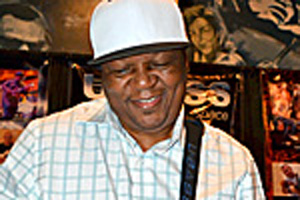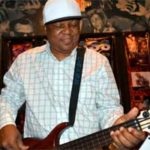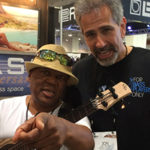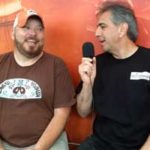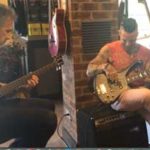Long-time Paul Simon bassist talks to FBPO about his career, from the early days in South Africa to the most famous bass solo in pop music history!
Exclusive interview with FBPO’s Jon Liebman
December 10, 2012
Bakithi Kumalo is a South African musician, best known for his longstanding position as bass player with Paul Simon. Most notably, Bakithi’s fretless slap bass interlude on Simon’s “You Can Call Me Al,” is perhaps the most famous bass solo in modern music history. Kumalo has also worked with Gloria Estefan, Herbie Hancock, Chaka Khan, Harry Belafonte, Cyndi Lauper and many others.
FBPO: Let’s start from the beginning. You have a very interesting background. Tell me about your musical upbringing.
BK: I was born into a musical family and it was chaotic because my mother was a singer, my uncle played saxophone and my father, who left me when I was a year old, was a guitar player. I just kind of grew up around the music, including church music. People used to walk around the street, singing and playing drums from different tribes. I was exposed to much South African traditional music.
FBPO: You were in Soweto, right?
BK: I was born in Soweto, yes, and then moved from one township to another.
FBPO: How did you become a bass player?
BK: I became very interested at an early age, when I saw my uncle’s bass player when they practiced at home. I just liked what he was doing. Every time they’d leave the house, I would mess around with his bass. It was very attractive and I liked it because it had such a big sound that I could feel in my chest. When he’d come back another day, he would show me a couple of things. I was young and he would talk to me about things like, “This is the string, the tuning pegs” and all that stuff.
Then at the age of 10, I started to join the local bands. The first instrument I played was guitar, classical style. I played with a band, not for a very long time, maybe for a month. Then the bass player quit the gig, so I moved to bass and just stayed with it. I also took to playing the saxophone. My uncle was playing a lot of saxophone, so he would teach me to play the alto saxophone. Between the alto and the bass, I played everything.
 FBPO: Was your exposure to music pretty much limited to what was happening in South Africa, or had you become aware of the kinds of music that were being played in other parts of the world?
FBPO: Was your exposure to music pretty much limited to what was happening in South Africa, or had you become aware of the kinds of music that were being played in other parts of the world?
BK: The music that was played in South Africa was mostly American music, like Motown and jazz. In South Africa, we also had a lot of “kwela” music, which is almost like swing, with a pennywhistle. And then a guy would play a plywood box, like a tea box, and there would be one string and a stick and a guy would move the stick and get different notes. It’s almost like the big bass with one string. There’s also the a cappella, like Ladysmith Black Mambazo, which is more like voices, and that helped me a lot with my fretless playing. That was before I even knew about Jaco’s fretless.
Some of my great friends used to buy CDs in the States and I paid a lot attention to all the bass players, like Alphonso Johnson. I was like, “Wow, this sounds like the bass that I’m playing.” It was almost like the human voice. That really helped to stay with the fretless. The only bass I owned was the one my mother bought for me. It was the cheapest bass and I got stuck with it.
I remember listening to Weather Report’s Heavy Weather record and trying to play “Teen Town” and “Havona.” There were things that I could just not understand or play, but I loved the songs. James Jamerson was another influence, playing on all those Motown records. I was really listening to a lot of that stuff and then tried to put that in the African music, not just the bass notes, but learning where to put the “one” and how to get that feel.
FBPO: I guess meeting Paul Simon changed your life forever in many ways. How did that meeting come about?
BK: It changed my life completely. As a young player, I really didn’t focus on what was going on in South Africa, but I mostly focused on the music that was coming from America. That was the music that was in my heart. And then when Paul Simon went to South Africa, I was ready because I had spent a lot of time in Zimbabwe and I spent a lot of time in Zululand, just to get that traditional, original stuff. So when Paul was putting Graceland together, I was ready for it. Also, listening to the guitar player helped. Most guitars play the melodies, so on the Graceland record, I just borrowed some stuff from the guitar player, Ray (Phiri), and then used the two bars off it. There was a lot of paying attention and listening.
FBPO: It’s hard to believe that that album is 25 years old. It doesn’t sound like any of the Simon & Garfunkel records. What was Paul looking for when he went to South Africa? What was he trying to say? Was it an Apartheid thing?
BK: No, here’s the thing: Paul had a friend in South Africa who was a producer and this guy sent Paul a tape of the Boyoyo Boys. Paul had never heard that township music before and he listened to the stuff and it just took him. He said he used to listen to that stuff all day long, over and over, and never get tired of it. He would go to sleep listening to that music.
Then one day he said, “Let me fly to South Africa and meet up with these musicians and just go there because the music is very interesting.” So he came to South Africa and they booked the studio and called the musicians to come to the studio and just jam with Paul. Paul told us to play anything.
This music was not about what was going on in South Africa, it was about love and romance. It had nothing to do with the Apartheid of South Africa. It was the rhythms that got Paul. I was thinking maybe I would get to play some American music. I played my fretless and we grooved with the songs and he just loved everything we played.
So that’s how Graceland came about. Then it turned out to be a problem because people thought that he went to South Africa to rip off the musicians, while of course, businesswise, some other people didn’t understand what was going on. I told Paul I really wanted to go to America and that’s when he took me from South Africa to America and finished the rest of Graceland.
 FBPO: I’ve got to ask you about “You Can Call Me Al.” You are the performer of probably the most famous two-bar solo in all of modern bass history. Is there a story there? How did that come to be?
FBPO: I’ve got to ask you about “You Can Call Me Al.” You are the performer of probably the most famous two-bar solo in all of modern bass history. Is there a story there? How did that come to be?
BK: There’s a story! The day we recoded it was my birthday, May 10, 1986. In the studio, we played the groove and then there was that break and Paul said, “Let’s take a break. Let’s break for lunch.” And I said, Paul, it’s my birthday today. Can I just play a little bit more on the part where there’s a break?” And Paul said, “Go ahead. If it’s good, we’ll keep it.”
I wasn’t slapping the whole thing, but when it came to that break, I just used my slapping because in the studio, the fretless sounded unbelievable! When I started to slap the bass, the engineer recognized that idea and came up with the backwards tape effect. Then he took the two bars and looped it. After we came back from lunch he said, “Listen to this!” He was going crazy! That engineer was a big part of my bass lines. It turned out to be a great piece.
FBPO: I bet most people don’t know you also play upright bass, as well as drums and keyboards and all kinds of percussion instruments. Every time I see you, though, you’re playing a Kala ukulele bass. When did you start playing that?
BK: I think it was four years ago. I was at Bass Player Live! in Los Angeles and I met my longtime friend Rick Carlson and he said to me, “Hey man, I’m working with this company now. Check out their basses.” So I looked at their basses and I said,” You know, I don’t play ukulele, man!” But he told me to just play it anyway. So I played the bass, thinking afterwards I would give it to my daughter. I just couldn’t stop playing it! I just kept playing it because it was very interesting. The strings, the length of the bass. And the sound was unbelievable! And I just kept playing it and playing it. A lot of other people are now interested in it, too. Abe Laboriel is now playing one.
FBPO: You did something together with Abe at the most recent Bass Player Live!, didn’t you?
BK: We do a duo. We’re still building up our duo because a lot of people tell me we have a similar style. Now we’re both playing the ukulele bass. “Hutch” Hutchinson of Bonnie Raitt’s band is playing one too. So is Pops Powell of the Crusaders. Reggie Hamilton plays one. It’s really good to have if you want to play a lot of different things. If you want to play reggae or jazz, for example. I use it for all my warm-ups, then I play it on the gig. I played it on the Paul Simon tour, the solid body and then the acoustic one.
FBPO: What kind of range do those instruments have? Is it the same as a conventional bass or is it a shorter range?
BK: It’s a shorter range, It’s the same as the bass in G-D-A-E, but it’s much shorter. I think it’s maybe a 22-fret.

Bakithi, with FBPO’s Jon Liebman, he NAMM Show, 2011
FBPO: Well, that’s plenty. That’s the same as most basses, so you can really go up there.
BK: Yeah, you can go up there. But you know, when I teach the little people, because of their little hands, they can play the higher notes. For me, though, sometimes when I play the higher notes, I play in two frets because as you go higher, the frets get thinner. The instrument is really great, though. They’re improving it all the time. I think there’s a new one with steel strings that you can slap on.
FBPO: Tell me about some of your solo stuff. Didn’t you and your wife do a couple of children’s albums?
BK: Yes, my wife, Robbi Hall Kumalo, was doing a lot of stuff with kids and that’s how I got involved. She’s a storyteller and she’s worked with a lot of people. She worked with Rod Stewart, Aretha Franklin, Mary J. Blige, Chaka Khan and Diana Ross. She’s doing this project with kids, going to schools and telling stories and sometimes writing songs. The kids come in and tell my wife their stories and their problems, then they’ll build up a song. So I got involved with that. I like going to schools at nine o’clock in the morning and working with the kids. And when they see my instrument, they go crazy like, “Wow, a big bass!” Since we started the project, we did about three records.
FBPO: What else is keeping you busy these days?
BK: My children.
FBPO: How many children?
BK: I have three kids. My oldest son is in South Africa with my granddaughter and here I’ve got two daughters, 14 and 16. Each one plays about five instruments. My oldest daughter plays trombone, bass, guitar and piano and the little one plays big bass, little bass, piano, violin and viola and she sings. We’re very busy.
FBPO: How about the future? What else would you like to do that you haven’t already accomplished?
BK: I’m learning every day. I’m still not there yet. I’m still finding my way. I made this change to come to America—I spent 25 years in Africa and then 25 years in America. I’m still learning. No matter what, you just learn all the time. I get a session and I go to the studio and I become a student because they’ll tell me what to do and then I just put the feel in and I make things happen. I’m still going and I’m still searching because I feel like I haven’t reached the point yet. I can push this over to the next generation and hopefully go all over the world and teach the kids something.
FBPO: Great attitude. Last question, Bakithi: What would you be if you weren’t a bass player?
BK: Good question! Two things: a doctor and a teacher. Growing up in South Africa, I wanted to be a doctor because I care about health and I care about people. I ended up playing in hospitals and playing for kids and donating my time to them, letting them touch the instrument. Then I look at their smiles and I think, “You know, I hope this helps you. Maybe this instrument is the medicine for you.” I always wish I was a doctor so I could help these kids and give them medicine so they can get out and leave this place for a better place. Or a teacher, so they can have something. Like if you teach them to catch a fish, they can eat and then teach the next generation. It just goes on and on.
See our exclusive FBPO interviews with Reggie Hamilton
and Alphonso Johnson, both of whom are mentioned here:
[table id=36 /]
